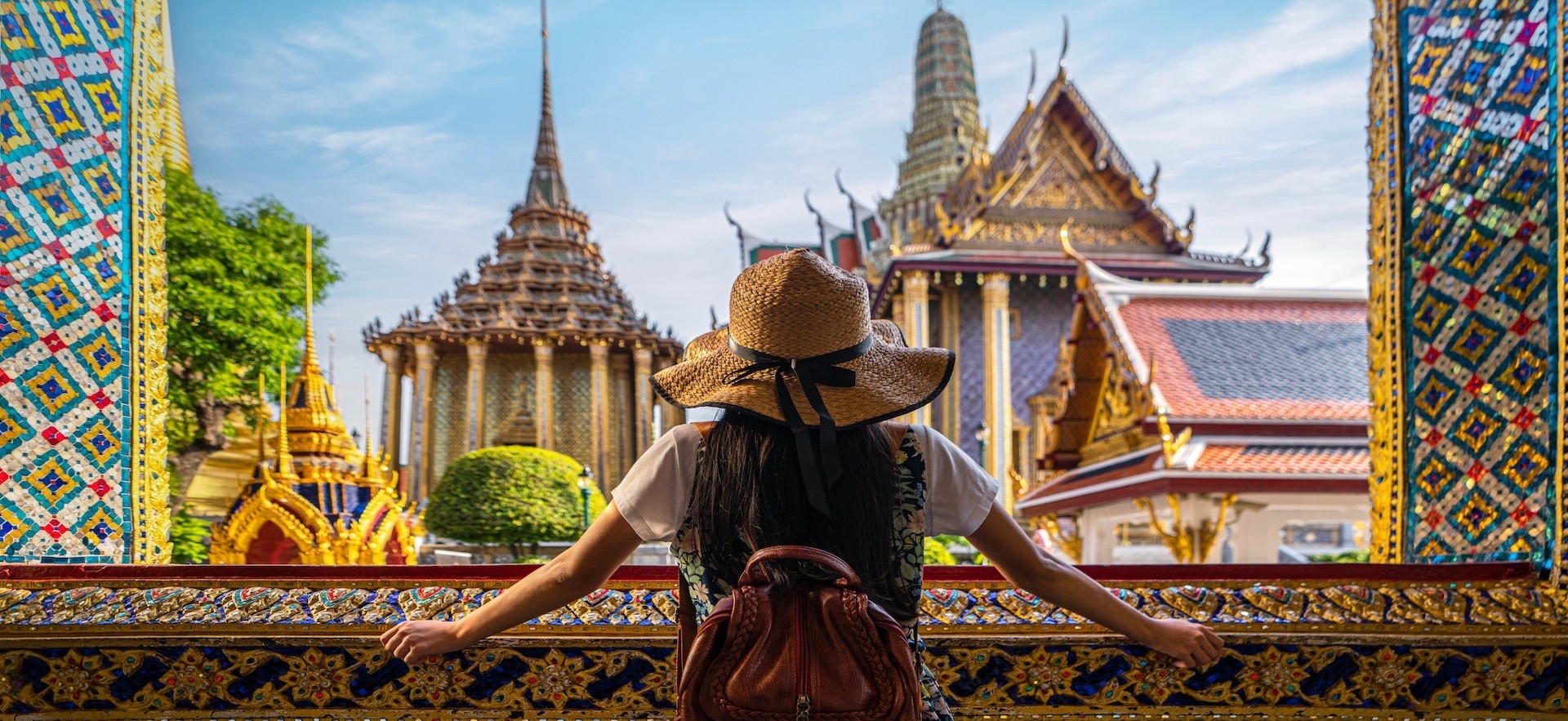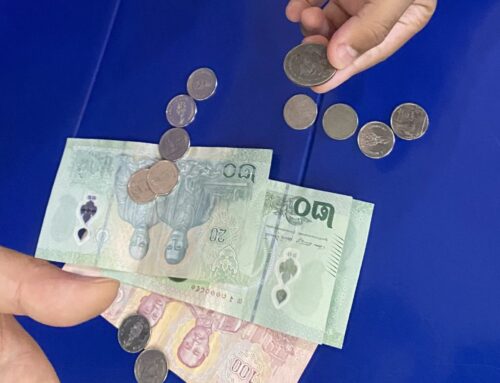By Josh Butterworth. Josh is our Thailand Program Coordinator, and lives in Thailand.
It’s no surprise that Bangkok was the most visited city in 2024, thankfully, the Land of Smiles welcomes all with open arms. But with flocks of tourists and expats brings a multitude of diverse people and cultures, some who can assimilate to the Thai way of life better than others, and some who stand out like a sore thumb.
As someone who’s lived in the Kingdom for over two years now – I’ve written this article to give you a few tips on how to fit in with the locals, avoid cultural faux pas, and connect with Thailand in a way most tourists never do.
DO’S
Speak
Unlike when your dad whipped out his best (awful) French on your summer holidays as a child, which was returned by a blank face and a response in English – Thais are usually far more grateful when you try to speak their language.
Nobody is expecting you to speak perfectly on day one, but doing your best is a must. Mastering a few simple phrases and taking the time to learn from Thais, whether that be in a coffee shop or your hotel reception, will help you have wholesome interactions and give you bags of confidence. But if you’re here for more than just a holiday – getting a tutor is a great idea, and shouldn’t set you back more than around £10 an hour.
I won’t lie though – it’s not an easy language to learn! The tones are complicated and there are sounds very unfamiliar to us English speakers, so I recommend listening as much as you speak, that’s how I made progress. Watch some Thai dramas with English subtitles, or check out some Thai vloggers (Mark Wiens may not be Thai but he speaks the language perfectly, I learned so much about Thai food from him and can’t recommend his videos enough, listening carefully to his conversations was incredibly useful).
Please, don’t blast unexpecting Thais with complicated English, expecting them to understand as their blank faces look into the distance for help – use a translator app (I always have Google Translate handy) and be patient. But first – try to speak using what you’ve learned on pages like this, and from videos like this. Good luck, โชคดีนะ!
Buddhism
Unlike in the West where religion does not play a significant role in most people’s daily lives – Buddhism in Thailand is integral in how most Thais live theirs, and should be respected accordingly.
And if you’re not visiting a temple or two – what are you doing? They’re beautiful places that you can enjoy regardless of your beliefs – but there are a few things to consider in terms of clothing and how to conduct yourself that will make sure you’re giving the place and the people in it the respect they deserve.
You should cover up your shoulders, knees, and skip anything tight or revealing. Remove your shoes, hats, and sunglasses too. Sleeveless tops and bare chests are a no-go, especially for men, and women should avoid low-cut or body-hugging outfits. Some temples are more relaxed than others, and most will offer scarfs to anyone who they deem not appropriately dressed before entering. Don’t overthink it but it’s important to consider if you’re planning a visit.
Respect monks by letting them pass, avoid any physical contact (especially for women), and offer items with both hands (women cannot pass anything directly to monks or sit next to them – silly, we know – but must be respected). Be mindful of Buddha images – don’t pose with them or point your feet at them. Stay quiet in sacred spaces and check it’s ok to take photos before you do so. Following these principles inside and outside of temples will be greatly appreciated by Thais!
Food
Thai food in Thailand is a million miles away from the green curry or pad Thai you get from your local Chinese on a Friday night – food is a very important part of life, is completely diverse and delicious, and serves as a window into the many cultures that make up this wonderful country.
Sharing a meal and feeding people is a way of bonding and showing care in Thailand, so if a Thai person invites you to eat – say yes, and do so with grace. This extends to restaurants too, if you don’t like something then it’s on you, try to have an open mind and always be respectful if it’s not your cup of tea.
There will be plenty of flavors and textures you’re unfamiliar with, that’s guaranteed, but Thai food is up there with the best cuisines in the world (I just spent a week in Indonesia, also home to plenty of delicious grub, but was missing Thai food within only a few days). Be open minded and try different things, I really recommend researching some dishes and restaurants beforehand, watching lots of videos and reading blogs.
The main takeaway I want to leave you with, unless you really have no interest in food at all, is that you’ll get so much more from Thai food if you learn about it! From Shan tofu noodles in Chiang Mai to Indian inspired roti and curry in Phuket – Thailand is an incredibly rich and diverse country with so many different people and cultures, who all come with their own food. Asking questions and learning about it only makes it even more delicious.
DON’TS
Feet
There is one concept in Thailand that we are completely unfamiliar with in the West – the idea that the head at the top of the body is the most sacred, and the feet at the bottom are dirty and spiritually low, understanding this is integral to grasping what I’m about to explain.
Pointing with your feet is seen as deeply disrespectful. Whether you’re gesturing towards something on a bottom shelf, nudging something across the floor, or crossing your legs with one foot on top of your knee (a mistake I made in the bank the other day, until I realised everyone else had both feet on the floor) – it can come across as rude or offensive.
Other than in temples, like I’ve already mentioned, I must stress that this isn’t something to worry about in day-to-day life. The security guard in the bank would not have told me off or asked me to leave, but more traditional or older customers may have rolled their eyes internally and thought, “ugh, silly foreigner” – so it’s best to be aware of it.
On the flip side, the head at the opposite end of the body to the feet – is sacred. Touching someone’s head, even playfully or affectionately, is considered rude unless you’re close family or are invited to do so. It’s unlikely you’d be touching an adult’s head anyway, but the same rule applies for children. I’ve patted a child’s head in the past, and the mother had absolutely no issues, plus I’ve seen plenty of old people doing the same to children they aren’t related to – but it’s best to aim for the shoulder or arm if you must do so at all.
Wai (all the time)
The act of waiing, placing your hands together in front of your chest as if praying and then bowing your head slightly, is an integral part of Thai culture – but knowing how to use it correctly can be confusing, I’ll do my best to talk you through it.
When you first discover waiing – you feel like you’ve cracked Thailand! You’ve unlocked a cheat code to show respect and you must do it to everyone and anyone you see. Please don’t!
It can take a while to work it out and you’ll have to go on a journey of discovery for yourself, but here’s a quick guide – waiing is not expected when greeting shop staff, street vendors, or anyone providing a service. In fact, if you wai in the wrong situation, it can come off as awkward or overly formal. Watch what locals do – if they offer a wai first, you can return it. If they don’t, a friendly smile and hello (in Thai) is perfectly fine.
That said, there are times when waiing is absolutely appropriate. Always wai to monks, elders, and in formal settings like ceremonies or meetings. Teachers should wai to their colleagues, especially those who are more senior, and only return a small wai to students if they offer one first. In short, if someone wais to you – return it. But don’t wai first to everyone and anyone, only those who are more senior or older, who you want to show your respect too. And I’d completely avoid it with people of your own age in social settings like a bar, unless you want to be the butt of jokes for a few minutes.
Money
You wouldn’t think twice of stomping down on an adventurous five-pound note as it flies out of your hand and makes its escape down the street – unfortunately, that tactic cannot be used in Thailand, and here’s why.
Thai money features the image of the King, and the monarchy is held in very high regard, at least traditionally and among the older generation – so stepping on a note or coin, even accidentally, can be considered an insult to the royal family. In extreme cases, it’s even a criminal offense under Thailand’s strict lèse-majesté laws.
This deep respect for the monarchy can be seen in many areas of Thai life. You’ll notice people standing in silence when the King’s anthem plays in cinemas or during public broadcasts. Pictures of the royal family are displayed in homes, schools, and government buildings – not as decoration, but as expressions of loyalty and love. Even casual jokes or comments about the royal family are not a good idea.
However, there is much discontent with the billionaire King and his royal family, and their role in a country within which there are many who have nothing. It’s a controversial and divisive topic, that’s generally split between the young and old – it’s a conversation that you should breach with caution amongst younger people, and avoid completely with those who are older.
Now you know how to get by – it’s time to put all your newfound knowledge into action and head to the Land of Smiles for an adventure of a lifetime. The best way to do that? As an English teacher of course! Earn money and experience authentic culture as you become part of the community – something a tourist can never achieve. We have exciting placements all across the country on our Thailand program, check it out and sign up today to begin your adventure in October 2025, let’s go!




